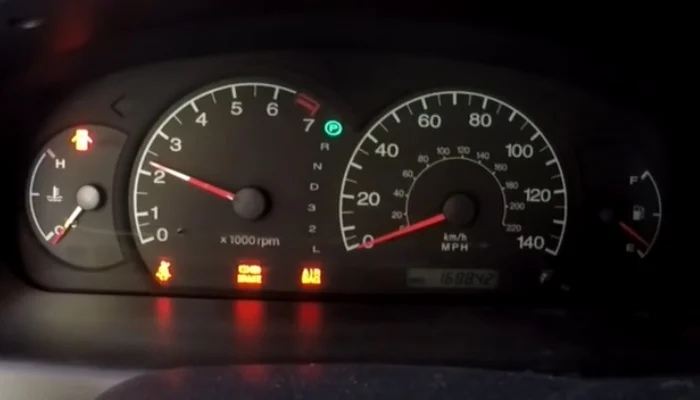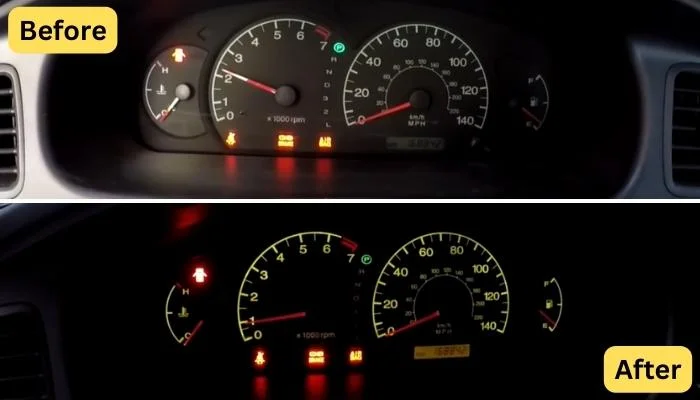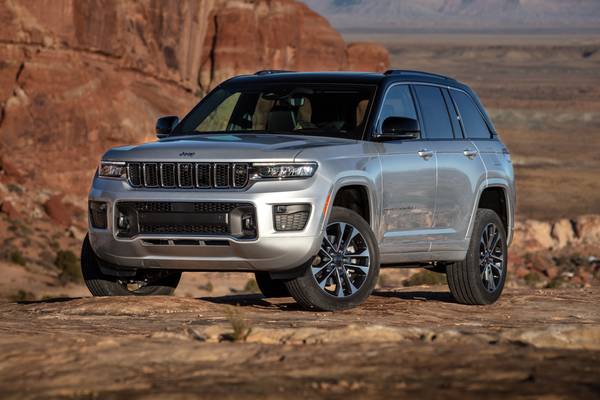A high-revving Jeep can result from a stuck throttle, vacuum leak, faulty sensor, or transmission problem. It’s crucial to have a qualified mechanic diagnose the specific cause to prevent potential damage and restore your Jeep’s normal operation.
If your Jeep is revving high, it could be because the engine is cold. When the engine is cold, it takes longer for the oil to circulate and reach all moving parts. This can cause the engine to rev higher than usual until it warms up.
Another reason why your Jeep may be revving high is that the throttle body or mass airflow sensor might be dirty. A dirty throttle body or mass airflow sensor can cause the engine to rev higher than normal. If you think either of these might be the problem, you should take your Jeep to a mechanic to have them take a look.
What is Engine Revving?

Before diving into the causes and solutions, let’s clarify what engine revving means. Engine revving refers to the act of the engine’s RPM (Revolutions Per Minute) rising without corresponding acceleration. In simpler terms, it’s when your engine sounds working harder than necessary, even when you’re not applying more throttle.
Common Causes of High Engine Revving
Several factors can lead to your Jeep’s engine revving higher than it should. Let’s explore some of the most common culprits:
1. Faulty Idle Air Control Valve (IACV)
The Idle Air Control Valve regulates the amount of air entering the engine at idle. When it malfunctions, it can cause the engine to rev excessively. Replacing the IACV is often the solution.
2. Vacuum Leaks
A vacuum leak occurs when air enters the engine without going through the throttle body. This can disrupt the air-to-fuel ratio, leading to high revving. Inspecting and repairing vacuum hoses can resolve this issue.
3. Throttle Cable Issues
A frayed or sticky throttle cable can cause the throttle to stick open, resulting in high RPMs. Regular maintenance and lubrication of the throttle cable can prevent this problem.
4. Dirty or Faulty Mass Airflow Sensor (MAF)
The MAF sensor measures the amount of air entering the engine and adjusts fuel injection accordingly. A dirty or malfunctioning MAF sensor can cause high revving. Cleaning or replacing it may be necessary.
5. Transmission Problems
Issues within the transmission, such as slipping clutches or low transmission fluid, can lead to high engine revving. A thorough transmission inspection and maintenance can resolve this.
6. Faulty Throttle Position Sensor (TPS)
The TPS communicates the position of the throttle to the engine control unit. When it fails, it can result in erratic engine behavior, including high revving. Replacing the TPS is typically the solution.
7. Engine Control Module (ECM) Malfunction
A malfunctioning ECM can send incorrect signals to the engine, leading to high RPMs. Diagnosing and repairing the ECM or its associated components is essential.
How to Resolve High Engine Revving

Now that we’ve identified the common causes let’s discuss how to address high engine revving in your Jeep:
1. Consult a Mechanic
If you’re not comfortable diagnosing and repairing the issue yourself, it’s best to consult a certified mechanic. They have the expertise and diagnostic tools to identify the exact problem.
2. Regular Maintenance
Preventive maintenance is key to avoiding high engine revving. Ensure you follow your Jeep’s maintenance schedule, including air filter and spark plug replacements.
3. Check for Fault Codes
Use an OBD-II scanner to check for any fault codes that may provide clues about the issue. These codes can guide your mechanic in the diagnosis.
4. Inspect Throttle and Cables
Regularly inspect the throttle body and cables for any signs of wear or damage. Lubricate the cables as needed to ensure smooth operation.
5. Clean or Replace Sensors
If you suspect a faulty sensor, such as the MAF or TPS, consult your Jeep’s service manual for guidance on cleaning or replacing these components.
Jeep 4.0 High Idle on Startup
If you own a Jeep with a 4.0 engine, you may have noticed that it idles high on startup. This is normal behavior and nothing to be concerned about. The high idle will last a few seconds before the engine returns to its normal speed.
There are a few reasons why your Jeep may idle high on startup.
- One reason is that the engine is cold and needs to warm up.
- Another reason could be that the throttle body needs to be cleaned. If your Jeep has been sitting for a while, the throttle body can become dirty and cause the engine to idle high.
If you’re concerned about your Jeep’s high idle on startup, there are a few things you can do to fix it.
- First, check the air filter and make sure it’s clean. A dirty air filter can restrict airflow and cause the engine to run higher than normal.
- You should also check the throttle body for dirt and debris buildup. If necessary, clean the throttle body with a suitable cleaner.
Finally, consult a qualified mechanic or dealership service department for further assistance if all else fails.
Jeep Wrangler Idle Problems
If your Jeep Wrangler is idling rough, there are a few potential causes.
First, the most common cause of idle problems is a dirty or faulty Mass Air Flow (MAF) sensor. A dirty MAF sensor can cause the engine to run lean, resulting in a rough idle. Clean your MAF sensor with compressed air and a cotton swab if it is dirty.
Another potential cause of rough idle is a vacuum leak. A vacuum leak will allow unmetered air into the engine, causing it to run lean and a rough idle.
To check for vacuum leaks, use a carburetor cleaner or starting fluid and spray around the intake manifold while the engine runs. If the engine speed increases, you have found your leak.
Finally, another potential cause of rough idle is an ignition timing issue. Ignition timing that’s too far advanced can cause the engine to run lean, resulting in a Rough Idle. You’ll need to take your Jeep Wrangler to a mechanic to check the ignition timing and adjust if necessary.
Jeep 4.0 High Idle Problem
If you own a Jeep with a 4.0 engine, you may have experienced a high idle problem. This is a common issue with Jeeps equipped with this engine. The good news is that there is a fix for this problem.
The high idle problem is caused by the throttle body not closing all the way when the engine is turned off. This causes the engine to idle at a higher-than-normal RPM when it is first started up. The fix for this problem is to adjust the throttle body to close all the way when the engine is turned off.
If you are experiencing this problem, take your Jeep to a qualified mechanic and they should be able to fix it for you quickly and easily.
Jeep Wrangler High Rpm
If you’re a Jeep Wrangler owner, you know that one of the best things about your vehicle is its ability to handle high RPMs. While other vehicles may start to experience problems at high speeds, the Jeep Wrangler is built to take whatever you can throw at it. Whether on the open road or off-road, your Jeep can handle anything you put it through.
Here’s a look at what makes the Jeep Wrangler so capable of high speeds:
A Strong Engine: The Jeep Wrangler comes with a 3.6L V6 engine that produces 285 horsepower and 260 lb-ft of torque. This engine is powerful enough to get you up to speed quickly and efficient enough to keep you going for miles.
Thanks to this strong engine, you won’t have any trouble reaching high speeds in your Jeep Wrangler.
A Sturdy Chassis: The chassis of the Jeep Wrangler is designed to be sturdy and durable. It’s made with high-strength steel that can withstand all sorts of abuse.
Whether you’re driving on rough terrain or taking on a steep incline, your Jeep will be able to handle it without issue. This sturdy chassis is one of the things that makes the Jeep Wrangler such a great off-road vehicle.
All-Terrain Tires: The tires on the Jeep Wrangler are designed for all types of terrain. No matter where you’re driving, these tires will provide plenty of grip and traction.
They’ll also help absorb some of the bumps and shocks that come with driving on rough roads. All-terrain tires are essential for anyone who wants to take their Jeep off-roading.
Jeep Cherokee Revs Up on Its Own
The new Jeep Cherokee seems to be having some trouble with its engine. According to reports, the engine has been known to rev up independently, without the driver doing anything. This has led to a number of accidents, and even a few injuries.
The problem seems to be with the Cherokee’s electronic throttle control system. When the system detects an issue, it is supposed to enter into a “limp home” mode, which limits the engine’s power. However, it appears that in some cases, the system does not work as intended.
As a result, the engine can rev up to high RPMs without the driver doing anything. Jeep is aware of the problem and is working on a fix. In the meantime, if you have a Jeep Cherokee, keep an eye on your engine speed and be ready to take action if it starts to rev up on its own.

Credit: www.edmunds.com
Why is My Jeep Revving High While Driving?
If your Jeep is revving high while driving, it could be due to several reasons.
One possibility is that the engine is over Rev limit. This can happen if you’ve modified your Jeep’s engine, or if there’s something wrong with the engine itself.
Another possibility is that the transmission is slipping. This can happen if the clutch isn’t engaging properly, or if there’s something wrong with the gears.
Finally, it could just be that your Jeep needs to be tuned up. If it hasn’t been serviced in a while, it could be time for new spark plugs, fresh oil, and so on.
Whichever of these is the case, it’s best to get your Jeep checked out by a mechanic as soon as possible to avoid any further damage.
What Causes Engine to Rev High?
When your engine revives high, it works harder than it needs to and wastes fuel. There are a few different things that can cause this.
One possibility is that the throttle is sticking open. This could be caused by a problem with the throttle body or throttle cable. If the throttle is sticking open, it will need to be replaced.
Another possibility is that the engine has an air leak. This could be caused by a problem with one of the intake hoses or gaskets. If there’s an air leak, it will need to be fixed before the engine will run properly.
If your engine is revving high, take it to a mechanic and have them diagnose the problem so it can be fixed.
How Do You Fix High Revs?
You can try a few things to fix the issue if you have high revs.
First, check your vehicle’s manual to see if there is a recommended RPM range. If so, make sure you’re staying within that range.
Second, check for any vacuum leaks. A leak can cause your engine to rev higher than normal. Third, check your spark plugs and wires to ensure they are in good condition and functioning properly.
Finally, have your vehicle’s computer system checked for any issues that could be causing the high revs.
Why Does My Jeep Rev Up When I Start It?
If your Jeep is revving up higher than usual when you start it, there could be a few different reasons why. It could be something as simple as the engine being cold and needing to warm up, or there could be an issue with the throttle body or spark plugs. If the problem persists, it’s best to take it to a mechanic to have it checked out.
Your Jeep may be revving up higher than normal when you start it because the engine is cold. When the engine is cold, it needs to rev up a bit higher to warm up properly. Once the engine is warmed, it should settle back into a normal idle.
If your Jeep is still revving high after the engine has warmed up, another issue may be at play. Another possible reason your Jeep is revving high on startup is an issue with the throttle body. The throttle body controls how much air flows into the engine; if it’s not working properly, the engine can rev up excessively.
This can usually be fixed with a simple cleaning of the throttle body. However, if that doesn’t solve the problem, you may need to replace the throttle body altogether.
Finally, fouled spark plugs could be another potential cause of a high-revving Jeep on startup. Spark plugs ignite the fuel in your engine, and if they’re dirty or old, they can cause your engine to misfire and rev erratically.
Final Words
Understanding “Why is My Jeep Revving High” is the first step in addressing this common issue. Whether it’s a faulty sensor, clogged filter, or other issues, taking prompt action can save you from potential engine damage.
Remember to consult with a professional mechanic if you’re unsure about diagnosing or fixing the problem.
FAQs on Why is My Jeep Revving High
Can high engine revving damage my Jeep’s engine?
Excessive high revving can lead to engine damage over time. It’s crucial to address the issue promptly to prevent long-term harm.
How can I diagnose the exact cause of high revving in my Jeep?
A professional diagnostic scan and inspection by a certified mechanic are the best ways to pinpoint the precise cause of high revving.
Is it safe to drive my Jeep when it’s revving high?
Driving with a high-revving engine can be unsafe and may lead to loss of control. It’s advisable to have the issue resolved before using your Jeep.
Can a clogged air filter affect fuel efficiency?
Yes, a clogged air filter can reduce fuel efficiency by making the engine work harder. Replacing the air filter can improve gas mileage.
Are there any DIY solutions for high revving?
Some issues, like a dirty air filter or vacuum leaks, can be addressed by DIY enthusiasts. However, complex problems may require professional intervention.
How much should I expect to pay for high revving issue repairs?
The cost of repairs can vary widely depending on the underlying cause. It’s best to get a quote from a trusted mechanic.

